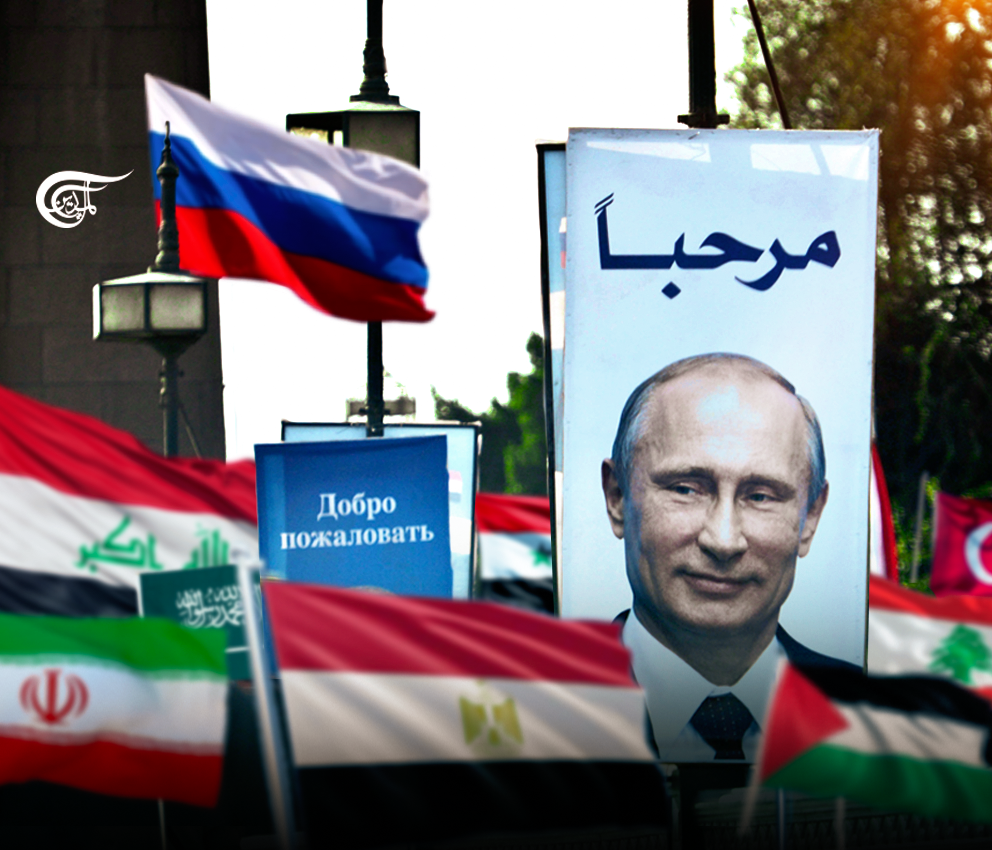Russian Return to the Middle East
Today it is common wisdom to claim that Russia is returning to the Middle East. Some regard it with hate, the others with suspicion, the third with hope.
Today it is common wisdom to claim that Russia is returning to the Middle East. Some regard it with hate, the others with suspicion, the third with hope. But before any evaluation according to interests and positions of different players and observers, we need first to clarify how Russia returns? What represents contemporary Russia on the new map of balance of world powers – especially regarding the Middle East?
In the last 50 years, Russia has thrice changed radically its geopolitical and ideological status. During the Soviet period in the context of a bipolar world, Russia was undoubtfully a geopolitical superpower, the stronghold of Land Power, and the center of universal communist ideology, seeking to gain the mortal fight with the capitalist system, for the global control on the human societies on a planetary scale. The opposite camp – NATO States – represented geopolitically Sea Power and liberal ideology. Geopolitics and ideology, interests and values were densely intertwined forming two totalities – two blocks, two projects for humanity claiming to evict sooner or later the opponent.
During this period the Soviet Union effectively was present in the Middle East – both as the power geopolitically opposing the capitalist West in most of regional conflicts, but at the same time supporting movements and parties that had in their programs and doctrines something that resonated roughly with the Left – secularism, progressivism, anti-capitalism, and anti-colonialism. The concrete politic of USSR in the region with a mostly religious population varied from the direct support of communist and socialists parties (not too influential and powerful) to pragmatic alliances with nationalist and anticolonial movement when they were not too religious.
So the function of the USSR in the Middle East was based on this two side scheme: geopolitical interests of USSR as great continental power (realist approach) combined with orientation to reach the goal of promoting communist World Revolution (idealist approach). We should consider this paradigm carefully because it shows two distinct cornerstones in the Soviet strategy. They were merged and intertwined in the whole complex but they were nevertheless different by nature and structure.
For example, this paradigm explains why USSR avoided dealing with anti-Western and anti-capitalist movements in the Middle East that were deeply affected by Islam and has religious values at their core. Salafism, Ikhwans, or Shiits were regarded by Soviets by mistrust. For the same reason, USSR itself provoked the disbelief inside these currents.
The Western pole had during the bipolar period a symmetric structure. The pure geopolitical interests (Sea Power) with its inherent scenarios repeating more or less literally force lines of old British imperialism were coupled with liberal ideology, always choosing in regional issues, the opposite side to socialist, leftists or anticolonial forces presumably naturally supported by Soviets.
The crucial moment comes with the collapse of the Soviet Union. That was the fall of the geopolitics of Land Power. The zone of influence of the core Heartland of Eurasia has shrunk radically on three circles.
· The large domain of influence including Latin America, Africa, and South Asia
· The Warsaw Treaty Organization
· The Soviet Union itself split into 15 parts.
In the realm of ideology, the change was yet more profound because Moscow has totally abandoned Marxism and embraced liberal capitalist ideology.
It was the end of bipolarism – in geopolitics and ideology. Russia has refused to continue to represent the second pole as an alternative, and accepted with Eltsine the role of periphery of the Same.
We need to remember that collapse of USSR as an ideological system was not accompanied by the symmetric abandoning by the USA and Europe of their liberal-capitalist ideology. The end of the cold war happened by the voluntary self-annihilation of only one of the players – the Soviet East has rejected its ideology but the capitalist West did not. That’s how liberal globalism has shaped its form. The globalization in the unipolar world was necessary to the expansion of liberal ideology, accepted by all as some universal norm – hence human rights, parliamentarian democracy, civil society, free market, and other purely ideological dogmas have become necessary global standards, ideological standards secured and promoted by the globalization itself.
There was a unipolar moment (as Ch. Krauthammer called it) that started in 1991.
In this period Russia has completely withdrawn from the Middle East. It was entirely engaged in inner problems balancing in the 90th on the edge of further collapse of Russia itself. But by pure inertia, some connections established during bipolarity were somehow conserved, as well as the image of Russia as a geopolitical alternative to the West; this image was still living in the societies of the Middle East. The unipolarity left the Arabic population one to one with the Atlanticist liberal West, which was finally free to affirm itself as a unique global player and the highest instance of the decision making. That is unipolarity and it affected the Middle East during the last 30 years culminating in a chain of color revolutions sponsored by the West in order to drown democracy, human rights, and liberalism in “retarded societies”.
The final purge of secular nationalist and somehow socialist regimes (as Baath parties in all its versions – in Iraq, Libya and Syria) has become inevitable – in the unipolar paradigm, there was no global symmetric power that would be capable to contend such processes and support anti-Western political systems and leaders.
Talking about the second pole – USSR from now on was the hole.
During the last 20 years of Putin’s rule in Russia, the country has restored partly its power. In the clear contrast to Eltsine’s contemporary first term in office, Russia didn’t follow unconditionally any order of the West and led its own sovereign politics. But this time, Russia restores its force only as great geopolitical power – as Land Power, hence the concept of Eurasia, the Eurasianism in general.
But in the field of ideology in Russia, there is a kind of vacuum. The gap left by rejected communism is filled with pragmatic and syncretic conservatism with no hard line. That makes Putin’s Russia much more flexible. Russia represents today's only geopolitical entity – more and more clearly opposed to the West (Sea Power) but without any clearly defined ideology.
At the same time, modern Russia cannot any more pretend to be the second pole in the bipolar structure. To play this role Russia is too weak compared with the aggregated potential of the USA and NATO countries. But there is new China whose economic growth has made it comparable with the American economy and threats to overcome it.
Hence Russia reaffirms itself not as the second pole in the new bipolar system, but as one of the few poles (more than 2!) in the context of multipolarity. Today Russia (militarily and on the level of geography and natural resources) and China (economically) already are two poles of something like a tripolar system. But India, the Islamic world, Latin America, and Africa can one day form other self-sufficient poles. So, the Russian geopolitics of the Great State evolves now in the totally new context of multipolarity. As usual, Russia is still the Land Power opposing Sea Power, but China is also the Land Power having exactly the same global opponent – the liberal West.
So, Russia returns to the Middle East in totally new conditions and with different functions. It is not a second pole opposing the West, but one of the few poles struggling against unipolarity in favor of multipolarity.
By the way, I explained these changes in my book “The Theory of Multipolar World” which was recently published in the USA by Arktos Publishers.
Final remark: The Western pole today, as before, is keeping its ideological content intact. More than that – during unipolar moment – when it yet looked like as something sustainable – liberal ideology seemed so powerful and indisputable, that globalists themselves – having no more formal ideological enemies - started to purge the liberal ideology itself, trying to make it yet more liberal. Hence, the disproportional volume of the gender problem raised in the last two decades. (I dedicated my book “Fourth Political Theory” to the discussion of this argument)
So now, I suggest the Middle East readers to compare the function of two global players in the contemporary regional balance of powers. The return of Russia in the Middle East is the coming of Land Power trying to resist the pressure of unipolar West, but this time without any ideological replacement of one secular materialist ideology by the other, of one form of capitalist totalitarianism with the other – communist. Modern Russia has nothing to impose on Middle East peoples on the ideological level. It is enough to regard Russia as an ally and to resist the pressure of the unipolar globalist West. No matter what is the reason for the rejection of the West by the Muslim population - religious, economic, national, or others. Russia is essentially in the Middle East to secure multipolarity not insisting on what should come in exchange for liberalism. This realism and this flexibility open totally new historical opportunities to Russian-Arab friendship.

 Alexander Dugin
Alexander Dugin
 9 Min Read
9 Min Read












